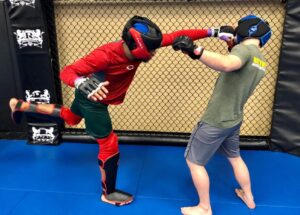Sparring is one of the most exciting parts of MMA training. It is where all the practice, conditioning, and drills come together in real time. For beginners, sparring can feel fast, intense, and even a little scary. It is normal to feel nervous or unsure in your first few sessions. While sparring is an essential part of learning, beginners often make mistakes that can slow progress, cause frustration, or even lead to injuries. Knowing what to avoid can help you enjoy sparring while improving safely and effectively.
TL;DR
Overdoing Strikes
One of the most common mistakes beginners make is using too much force in their punches, kicks, or other strikes. When you first start sparring, it is natural to want to land a strong hit or show off the techniques you have been practicing. However, overcommitting can make you lose your balance, leave you open to counters, and tire you out very quickly. Sparring is not about hitting as hard as possible. It is about control, timing, and accuracy.
A good way to practice is to start light and focus on precision. Make sure you can recover after every move, keeping your stance stable and your hands up. Think of sparring like a game of chess rather than a fight, you want to land your strikes intelligently, not recklessly. By controlling your power, you will be able to last longer in a session and learn more from each exchange.
Forgetting Defense
Beginners often get caught up in attacking and forget about defending. Dropping your hands, standing still, or failing to move your head makes you an easy target. Defense is just as important as offense because it teaches you how to read your opponent and protect yourself. Basic defensive techniques like blocking, parrying, slipping punches, and moving your feet can prevent unnecessary hits and make you more confident in the ring.
It is easy to underestimate defense at first because you are excited to land your own strikes. But learning to defend well is crucial. Even simple moves like keeping your guard up or stepping back at the right moment can make a huge difference, allowing you to stay in control and turn defense into an opportunity to counterattack.
Not Breathing Properly
Many beginners forget about breathing while sparring, but it is very important. Holding your breath, tensing up, or panicking can cause fatigue quickly and make your techniques sloppy. Proper breathing helps you stay calm, keep your energy up, and recover faster between exchanges.
A helpful tip is to exhale during strikes and try to maintain steady, even breaths throughout the session. It may feel awkward at first, but controlling your breathing will make your movements smoother, your strikes sharper, and your overall sparring experience much less exhausting. Proper breathing also helps with focus, allowing you to react to your partner’s movements more effectively.
Moving Too Fast Without Thinking
Many beginners rush through sparring without thinking about strategy or positioning. Speed is exciting, but moving too fast can lead to mistakes, poor technique, and missed opportunities. Good sparring is not just about throwing punches quickly, it is about timing, distance, and reading your opponent.
Effective sparring requires thinking one or two steps ahead, controlling the space between you and your partner, and knowing when to engage or step back. Slow, deliberate movements often teach more than fast, chaotic exchanges because they allow you to understand cause and effect. Learning to combine speed with strategy is what separates beginners from more advanced fighters.

Not Respecting Your Partner
Another common mistake is not adjusting your intensity to match your partner’s skill level. Sparring is a learning experience for both participants. Being too aggressive or reckless can cause injuries and make it harder for your partner to learn. Communication is key, talk to your partner before sparring, agree on the intensity, and check in during the session if needed.
Respecting your partner keeps both of you safe and creates a positive environment for learning. Remember, sparring is not about winning, it is about learning together. Developing trust with your partner also allows you to experiment with new techniques in a safe way, which can accelerate your progress.
Not Reflecting After Sparring
Beginners often get so caught up in the session that they forget to think about what went well or what could be improved. Each sparring session is full of learning opportunities, from noticing which strikes landed cleanly to identifying gaps in defense. Taking a few minutes after sparring to review your performance can make a huge difference in your growth.
Ask yourself what worked, what did not, and what you can do differently next time. Reflection ensures that mistakes are not just repeated, but turned into lessons. Over time, this habit helps you improve faster and makes each sparring session more meaningful.
Final Thoughts
Sparring is as much a mental challenge as a physical one, especially for beginners. By avoiding common mistakes like overdoing strikes, neglecting defense, not breathing properly, moving too fast without thinking, not respecting your partner, and skipping reflection, you can make sparring safe, fun, and productive. Remember, sparring is not about winning, it is about learning, improving, and growing. Approaching it with patience, focus, and respect will help you become a confident MMA fighter who can handle pressure, stay calm, and keep learning. With each session, you will gain more skill, more understanding, and more confidence, turning mistakes into stepping stones for success in MMA.


